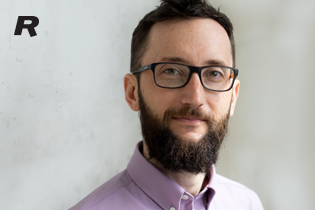
In September of 2019, Rotman Assistant Professor Peter Wittek went missing during a mountaineering expedition in the Himalayas, after being caught in an avalanche. Peter was a valued member of the Rotman community and his loss is keenly felt.
Professor Peter Wittek might be the first to admit that his faculty position at the Rotman School of Management seems a bit bizarre.
“My CV is difficult to follow,” jokes Wittek, whose training is in mathematics and computer science, but who now specializes in quantum-enhanced machine learning research.
With the focus of his academic work split evenly between computer science and physics, it’s difficult to place him in one academic stream. However, when he and others considered how quantum machines are poised to disrupt most industries, they soon realized how a business school might be the perfect place for an expert in the space.
Since joining the School last year, Wittek has been focused on continuing his research, supporting the Creative Destruction Lab’s Quantum Machine Learning Stream, serving as a data scientist in residence with the TD Management Data and Analytics Lab, launching a new quantum machine learning MOOC and creating partnerships across the University. He has a lot to say about what a future with quantum machines could look like, why it’s the right time, and how Toronto is the right place to think about quantum.
The quantum race and tackling the big questions
The great excitement around quantum computers lies in their potential to perform certain complex calculations that today’s machines can’t handle. This opens up exciting opportunities for more advanced data encryption, financial modeling, drug discovery and other applications that rely on complicated mathematics and simulation software.
“It’s hard to know what to expect with quantum machines. The types of calculations they do and the problems they will solve are so different from what today’s computers are capable of,” explains Wittek. “We can’t even begin to imagine the types of opportunities that quantum computing will create.”
“We can’t even begin to imagine the types of opportunities that quantum computing will create.”
—Peter Wittek, Assistant Professor, Strategic Management
He is particularly interested in how quantum computers might enhance artificial intelligence and machine learning — an application area where machines are able to identify patterns or ‘learn’ from large data sets, without being directly programmed to do so.
Wittek, who is an assistant professor in the Strategic Management area at the School, is focused on answering the big questions related to machine learning theory, including defining the nature of intelligence, understanding the physical limits of learning and what it means to learn on a physical level.
This work is especially relevant now, as we enter the early stages of the quantum race, which has teams of physicists and computer scientists competing to build the first state-of-the-art quantum computer — which would require around millions of physical quantum bits, or qubits, to run. To date, the most advanced universal quantum computers run on a few dozen qubits, whereas more specialized ones have scaled up to using a few thousand qubits.
“We are definitely at the beginning of the race,” says Wittek. “I think a 20-year timeline is optimistic in terms of the type of machine we’re looking to build.”
There is money and talent devoted to furthering the cause. Governments around the world have already committed billions of dollars to further quantum research. Tech giants like Google, IBM, Microsoft and Alibaba are actively working on building these machines. Though it’s not certain whether the investments will pay off, it is starting to feel like progress is being made.
“Lately, a lot has been happening in the space. My expectations are consistently exceeded by each engineering breakthrough and news that we’re developing machines with more qubits.”
Why we need to think about quantum computing now
As academic director of the CDL’s Quantum Machine Learning Stream, Wittek is also supervising startups that are trying to incorporate quantum computing into their business strategy.
One major part of the job is explaining why — when we seem so far away from building the hardware — software startups are already thinking about quantum applications.
Wittek insists that now is the time to do the work.
“Startups don’t take off overnight. We know that it takes, on average, about two to three years for a new company to get off the ground, to secure funding and to finalize the design of their product,” says Wittek. “If we start now, the technology will catch up,”
When he looks at the speed at which technology is advancing, he suspects that in a few years, quantum computers will be able perform certain calculations far faster than the ones that exist today. And in a few more years, he anticipates that quantum computers will be able to address a wider range of applications.
“When the technology comes, those startups will be ready to take their ideas to market.”
Why Toronto is the right place for quantum
Wittek is also sure that he’s in the right place.
He likes to point out that Canada, remarkably, has two well-known quantum-related hardware startups: Xanadu, a Toronto-based hardware company that was grew out of the CDL, and D-Wave Systems, which made headlines for releasing the first commercially-available quantum machine.
There is also no denying that Toronto has fostered a strong culture of innovation, thanks to the CDL and incubators at U of T and around the city.
“Toronto is becoming known as the place to develop and commercialize quantum applications,” explains Wittek. “There’s just a general buzz around quantum in the city. It’s happening here.”
Written by Rebecca Cheung | More Rotman Insights »